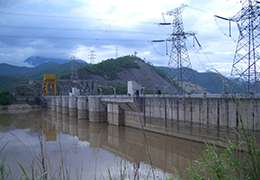Something fishy about proposed dams

(Phys.org)—Millions of people are in danger of going hungry if the construction of dams on the lower Mekong River in South-East Asia goes ahead, according to research from The Australian National University.
Dr Jamie Pittock from the Crawford School of Public Policy in the ANU College of Asia and the Pacific, and co-authors, studied the potentially devastating economic, social and environmental consequences of the proposed dams on the lower Mekong states of Laos, Thailand, Cambodia and Vietnam.
"There are around 60 million people who live in these countries whose main source of protein is freshwater fish. Eleven major hydropower dams have been proposed on the main stem of the river, in addition to a further eight that are being constructed in China," Dr Pittock said.
"These dams will block the migration of freshwater fish, which will reduce the fish breeding and change the water flows. This will dramatically reduce the amount of fish available which will fall somewhere between 16 and 42 per cent, depending on how many dams are built."
Dr Pittock said a vast area of additional land and a huge increase in water would be needed to replace lost fish protein with livestock products.
"Some 2.8 million people are in danger of going hungry if food prices go up by more than 10 per cent. Primarily from rural areas, they depend on fishing and farming for their livelihoods. If this protein is to be replaced, where would it come from and what would it mean environmentally?" Dr Pittock said.
"Countries like China are increasingly relying on hydropower because it is considered a low carbon source of energy. But if you lose fish and scale up the other sources of protein that people are already eating, such as poultry, pigs, goats and buffalo, how much water and land do you need?
"The answer is an awful lot. The amount of water required to produce this livestock would increase by six to 17 per cent and although this is a water-rich area, there are some places like Bangkok that are water-scarce.
"Converting rainforest to pastureland has implications in terms of carbon emissions, changes in land ownerships and impacts on the environment. Cambodia and Laos would be impacted most, and Vietnam and Thailand are already running out of enough land to grow livestock. There is still time for the Laos Government to delay any decision until there's better information, or agree not to dam the main stem of the river and maintain the wild fishery."
Provided by Australian National University




















